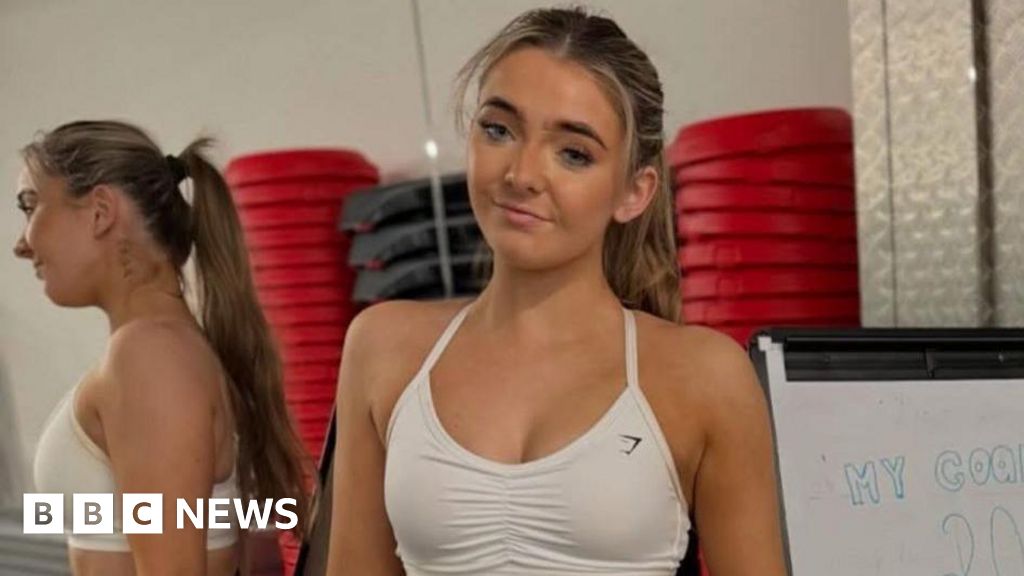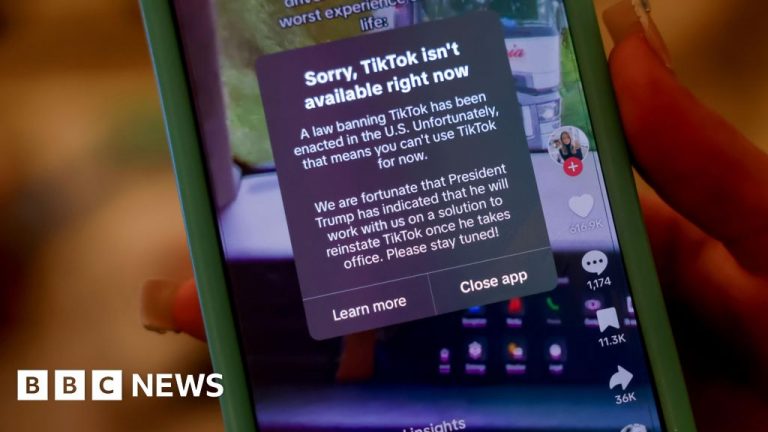 BBC
BBCEmily Morris, 21, from Swindon spends around £20 a month at Chinese fast-fashion giant Shein, turning to it whenever she needs a new party or holiday outfit.
“You can almost always find what you’re looking for, even if the quality is bad”, she says.
Like millions in the UK and the US, she buys from the online shop mostly because of how affordable it is.
The firm has faced scrutiny over how it treats workers, with a BBC investigation highlighting 75-hour weeks for workers in contravention of Chinese labour laws, but it is unlikely shoppers will be put off buying their clothes there.
‘Affordable’
Emily has considered stopping buying from Shein due to its labour practices, but says everywhere else “is way too expensive”.
“I’m happy to talk about the fact I shop at Shein because I know I’m not the only one,” she adds.
The numbers show she’s right, with Shein transforming from a little-known company just a few years ago into one of the world’s biggest clothing firms.
Global sales are estimated to have reached $36.9bn (£30.2bn) last year, according to GlobalData.
Shein is a private company and does not report its global results.
But profits in the UK doubled in 2023 to more than £24m, according to a Companies House filing.
Shein stocks thousands of different clothing lines, dwarfing rival fast fashion brands such as H&M and Zara.
It sells many clothes for below £10, and turns around new designs quickly.
The firm has been gearing up for for a stock market flotation in the UK, putting it under scrutiny over both its working practices and its environmental impact.
Last year, Shein itself found child labour in its supply chain after tightening scrutiny of suppliers.
It has also faced allegations that it uses cotton produced using forced labour, and last week declined to tell MPs whether it used such cotton.
Shein was contacted for comment.
In response to the BBC investigation into worker conditions it said it is “committed to ensuring the fair and dignified treatment of all workers within our supply chain” and is investing tens of millions of dollars in strengthening governance and compliance.
“We strive to set the highest standards for pay and we require that all supply chain partners adhere to our code of conduct,” it said.
Workers get paid about one to two yuan for making a tee-shirt – which is the equivalent of between 11p and 22p.
Sarah Johnson, the founder of consultancy Flourish Retail, a former head of buying and merchandising for Asos China, said the firm could pay suppliers more, which would give them more leeway to pay workers.
The supplier “doesn’t get paid an awful lot of the final price” of the garment.
When it comes to workers, “you could raise their pay and it would make a minimal amount of difference to the garment price,” she said.
An alternative would be for the firm to make less profit, she added.
‘I’m going to save up’

Sophie Wills, from Birmingham, said she had previously bought clothes from the retailer due to their affordability.
“Times are hard,” Sophie says, adding she probably couldn’t afford higher end clothes at the moment.
However, she says saving up and “making investments in stuff that is probably higher quality would be a good way to go”.
‘My whole outfit is from Shein’

Thando Sibenke says she regularly shops at Shein.
“My whole outfit’s from Shein right now,” she says, adding she likes the price, convenience, and variety.
However, Thando says she plans to do more research in the future on how the clothes she buys are made.
‘I’m embarrassed’
Georgina, 24, from London, says she is “embarrassed” that she has shopped at Shein – and has now stopped.
“Since reading up on it, the negatives massively outweigh the positives and even when seeing Shein clothing in charity shops, I don’t feel comfortable buying it.”
Fashion designer and academic Shazia Saleem said that people in Generation Z – those born between about 1995 to 2010 – often say in surveys that sustainability and ethics are important to them, but that doesn’t necessarily come through in their buying choices.
Young people can feel pressure to buy new outfits to keep up appearances on social media, and they don’t have much disposable cash, so will probably continue to buy fast fashion, she said.
She added that although people should make informed buying decisions, it should be down to the government to strengthen existing UK trading standards rules to make sure companies are selling sustainable and ethically-sound products.
Louise Deglise-Favre, senior apparel analyst at GlobalData, also said she expected affordability to continue to outweigh ethical concerns for Shein shoppers.
Younger customers tend to not have much disposable income due to being in school or low paying jobs, she said.
Shein releases thousands of new products daily, which can encourage shoppers to buy too much – but it’s also a response to “the desire from consumers to constantly update their wardrobes with the latest trends”, she adds.




























+ There are no comments
Add yours